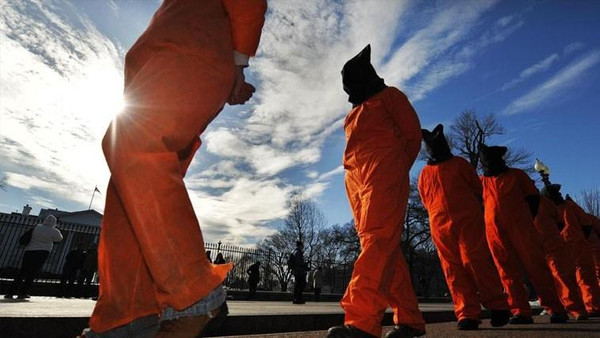
Five men held for a dozen years without charge at the U.S. Navy base at Guantanamo Bay, Cuba, have been sent to the Central Asian nation of Kazakhstan for resettlement.
The two men from Tunisia and three Yemenis are among dozens of men held at Guantanamo who have been cleared for release but cannot be sent home.
All five were captured in Pakistan and held in Guantanamo as suspected militants with ties to al-Qaeda. A government task force determined they no longer posed a threat.
A Pentagon statement Tuesday said the release of the five brings the Guantanamo prisoner population to 127. Nearly 30 prisoners have been resettled in third countries this year as part of President Barack Obama’s renewed push to close the detention center over opposition from Congress.
The five men “were unanimously approved for transfer” after a thorough review by a task force of several U.S. government agencies, the Pentagon said in a statement.
The transfer of the five detainees leaves 127 inmates still held at the prison, located at a U.S. naval base in southeast Cuba.
The five inmates, who have never been tried in court and who were cleared for transfer by authorities in 2010 or even earlier, have spent more than 11 years at the Guantanamo prison.
The number of detainees transferred out of Guantanamo in 2014 is now at 28.
The prison at Guantanamo Bay — which human rights groups have condemned as a “legal black hole” — is approaching its 13th anniversary, as the first detainees arrived on January 11, 2002.
Of the 127 inmates still held there, 59 are cleared to be transferred to their home countries or third countries.
With the release of the two Tunisian detainees, there is only one Tunisian national still held at the prison. At one point, there were 12 Tunisian inmates at the jail.
The Pentagon identified the Tunisian nationals transferred Tuesday as Adel al-Hakeemy, and Abdullah Bin Ali al-Lufti.
The three Yemenis who were transferred were identified as Asim Thabit Abdullah al-Khalaqi, Muhammad Ali Husayn Khanayna and Sabri Muhammad Ibrahim al-Qurashi.





